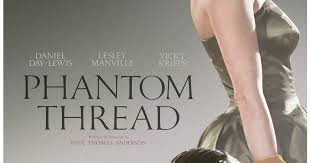Review by © Jane Freebury
High end fashion is not a place to expect to find the actor Daniel Day-Lewis. Over his long career he has fought on the American frontier alongside the Mohicans, he has led a vicious gang in 19th century New York and he has done ruthless business as an oil tycoon. Yet here he is, overseeing rippling lengths of silk and lace that are gathered into gowns for the rich and famous, a fastidious couturier.
The time is the 1950s, the place is London. Reynolds Woodcock (Day-Lewis) is the go-to designer of modish and extravagant gowns for high society customers. His tough-minded sister Cyril (Lesley Manville) is in charge of the business, and to some extent she also runs her brother’s love life. When it becomes apparent that his latest conquest is boring him, she asks whether it’s time to have the lady move on.
With a sister prepared to do the dirty work for him, that whiff of danger in the Day-Lewis screen persona is kept in check in this role. Though Woodcock has mastered the sneer, and he doesn’t hold back when the tranquility of his creative space is interrupted. Paul Thomas Anderson’s film is a portrait of creative genius, after all.
In the final reveal, Phantom Thread is a sly, darkly comic study of intimate relationshipsThe designer cannot abide the sounds his companion makes at breakfast, just buttering and munching her toast is enough to set his teeth on edge. Early morning is the best time for him to sketch out his ideas, so the racket – so subtly amplified by the sound department - is intolerable. In short, for all his suave charm, Woodcock can be a right pain in the butt.
An expose of the brittle character of genius is not new, and not so much the point here as the issue of control. Phantom Thread is about a new relationship that he embarks on, with Alma (Vicky Krieps) who is someone a bit different from the usual compliant and subservient woman, and someone whose character is not that easily read.
In the final reveal, Phantom Thread is a sly, darkly comic study of intimate relationships, the co-dependency and the give and take.
On a visit to the country, Reynolds is smitten by a willowy waitress at a local restaurant. He is more interested in Alma for her modelling potential than he is in her as a conquest. He likes certain qualities, the hint of a tummy and the small breasts. She will inspire him. She has the faintest accent – where is she from? – and she speaks her mind. Without exactly talking back, she refutes the control he tries to exercise over her, and maintains his interest.
As her appeal finally does begin to wane, Alma musters resources in the dark arts that we could have never guessed she had to fall back on and the film drifts into the murky territory of intrigue and betrayal in romantic relationships where the master Alfred Hitchcock loved to work. Just where was it Alma said she came from? The film deftly touches on 1950s’ xenophobia and its fear of the unknown, with its echoes today.
The film doesn’t falter at the strange and unexpected turn in events in its resolution, because Day-Lewis and Krieps are both so good at maintaining the fiction. No doubt, it's also due to writer-director Anderson, who directed Magnolia, There Will Be Blood (also with Day-Lewis), and The Master, keeping a firm hand on things.
There are some surprising moments of naturalism, in what looks like improvisation between the lead actors when the couple argue heatedly. Again, Day-Lewis and Krieps are so good they hold this risky new tonal register in check too.
Phantom Thread is an intriguing title for a film with one of the screen’s most successful and most elusive actors. Day-Lewis carries three Oscars under his belt. It is said it may be his last performance on the cinema screen, but I wouldn’t count on it.
Rated M, 2 hours 10 minutes
3.5 Stars
Jane's reviews are also broadcast on ArtSound FM 92.7

